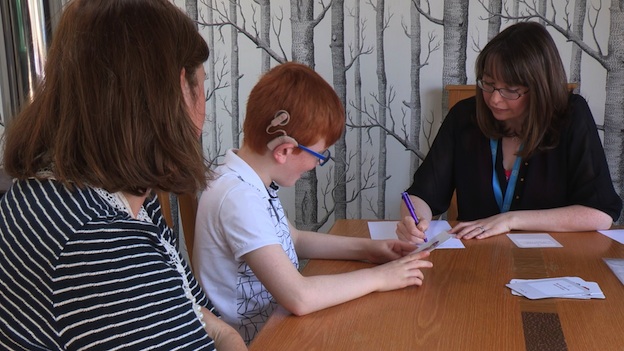
Today, I have finally got around to watching the BBC Alba’s documentary The Switch On which follows the story of 5 cochlear implant patients at Crosshouse Hospital in Kilmarnock. Now I am the first to realise that I am a little late writing about this and I am aware that there have been some fantastic blogs already written and which could be found on the Limping Chicken Deaf Blog here. But as usual I would like to stick my two pennyworths in.
Firstly I would like to say how refreshing it was to watch a programme which shows the reality of having a cochlear implant rather than all those viral videos that you see. I am not disputing that for some people their switch on may in fact be almost ‘miraculous’ but this is far from the norm and these videos do not show the long process which happens before the switch on.
I have a cochlear implant myself and to say it has been a success is an understatement but I need to give people a bit of a reality check. Firstly I think it is important to acknowledge that I cannot hear, nor ever will hear, in the same way that a person who has natural hearing can. I struggle in environments with background noise, I still cannot understand people with strong accents, and still cannot watch the television without subtitles. I have to be actively listening in order to be able to hear what people are saying and this active listening does not come naturally to me. I doubt it ever will now as I have had the implant for several years. That said, I do not and never will regret having my implant. I am able to hear better than I ever have and quite honestly life is easier for me now.
The programme shows some of the difficulties of going through the implant process which I can relate to myself. I faced many hurdles during the journey. Initially there are the numerous tests that you have to do to be able to find out if you are a potential candidate. These tests are mentally and emotionally exhausting. Not only is there the need for total concentration during them but also the worry that maybe you might not do well enough and therefore not be able to have an implant. You can literally be on tenterhooks for weeks waiting to find out whether you can go ahead with the operation or not. Then there is the big decision of whether you should actually go ahead or not.
The list of possible side effects and risks are long and need to be weighed up. Then the wait for your operation date and becoming more and more nervous as the days/weeks pass. Next the operation itself and the recovery period afterwards; my tinnitus was horrendous, I had an awful metallic taste in my mouth, and I felt generally awful after the anaesthetic. Finally the anxious wait to find out if your operation has been a success.
You don’t see any of this in the viral videos.
The Switch On shows different experiences at switch on, from total disappointment to one of pure joy and I think that this is important too. It highlights the long rehabilitation period necessary and the commitment that is needed. Driving back and forward to a hospital miles away requires a serious financial and time commitment. It is essential that you do all the exercises and activities that the implant team suggest to you afterwards and that requires commitment too. I personally think the year after I had my implant switched on was the most demanding and tiring year of my life to date. I was continuously exhausted with having to decipher what all the sounds I was hearing were and no one had really warned me about that.
I am aware that I am making having an implant sound like a very negative experience when in fact this wasn’t the case. There were many positives and these did outweigh the negatives. I did cry many tears of joy; the first time I heard my son’s voice in a long time, the first time I heard music again, the very first time that I heard the birds sing, speaking to my Granddad on the telephone, the list is endless. I just feel the need to highlight all the other tears too and am so pleased that The Switch On does.
Why, I hear you ask. There are two main reasons for this. Firstly I strongly believe in informed choice. How can a parent or deaf person make a decision about whether to go ahead with a cochlear implant unless they fully understand the positives and the negatives? Frequently people think of the negative as being the cochlear implant not working, and whilst I agree, there are other negatives if the implant is successful which are not spoken about as often. The second reason I am pleased is that as a cochlear implant wearer myself I live daily with the misconception that I can hear miraculously like a hearing person does. This misconception makes my daily life so much harder. I constantly have to explain that whilst I have an implant I still need someone to look at me and I still use interpreters in some situations for example.
My heart literally sinks when a well-meaning friend tags me in one of those switch on videos on Facebook. I will now be able to respond my recommending that they watch this documentary. My hope is that more documentaries like The Switch On will be made and shared.
